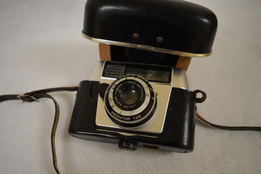
“Remembering what my father wanted for me was the motivation to keep going – that there had to be a better life. There had to be a better present. My safeguard was to think of looking at the world through the lens of my dad – how he saw me, rather than everybody else.”
Delila began life with a privileged upbringing in Quito, Ecuador.
For the first eight years of my life, I had a very privileged life. My father was Argentinian and he came to Ecuador being an engineer in textiles. He owned a factory where he designed socks and stockings. He had many contacts. We used to go the Embassy for their annual get togethers. Looking back, it almost sounds like a fantasy – we would go to the runways to pick the dresses we would wear! So for the first eight years, it really was a privileged life.
Then, one day, when she was eight, her father never came home. Delila’s mother left for the United States soon thereafter, and sent money back that funded her children’s continued private school education. Delila commenced living with her grandmother.
So, in one year, I lost my father, I lost ‘the life,’ I lost a family, and I lost my mother, because she came to the United States for seven years. So I ended up growing up without my parents. And all my aunts and uncles, and my grandparents, and my grandmother’s siter — they wanted to be my mom and dad. I decided that I wouldn’t listen to any of them, so I grew up a bit of a rebel.
Her rebellion led to some tensions, and Delila experienced a variety of abuses living in her grandmother’s house.
With my mother’s family, I suffered many pains and many insults . My family, because they saw me as a rebel, they told me that I wasn’t going to amount to anything. Often times, I was the bad example for my sister. When they were angry at what I did, they would accuse me of being the reason my father left, or tell me, if my father was there, he would be so ashamed of how I was behaving. Or, they would tell me that in the path that I was taking, I was never going to amount to anything.
At these times, Delila found solace in her memories of her father, and the way he had believed in her abilities and built her self-confidence, before he’d left them. She recalls several specific moments.
I remember when we went to my interview for kindergarten, because we went to a private school. I remember the principle sitting on the other side and asking questions, and how proud my father was, and him telling me that I was doing a good job. I don’t remember words -- I remember the feelings. I also remember in first grade I was called out to do a speech in front of the whole school. One of my uncles was helping me to practice, bringing me the broom to be the pretend microphone. And I remember my father just being confident. I think that his confidence was more felt than spoken.
Delila left Ecuador when she was 16 years old. Her mother brought her to the US illegally after Delila delivered news of an impending marriage. It was when Delila returned to Ecuador, thirty years later, that she retrieved her father’s camera, on display here.
When my aunt told me that she had it, and that she was giving it to me, to me it was like the biggest inheritance that I could ever have. Because this is the camera my dad used to see the world. And he saw me through this lens. And I think that he would be proud of me now. Because in many ways I am what he wanted me to be.
What our parents think of us is so powerful that even in its absence it is influential.